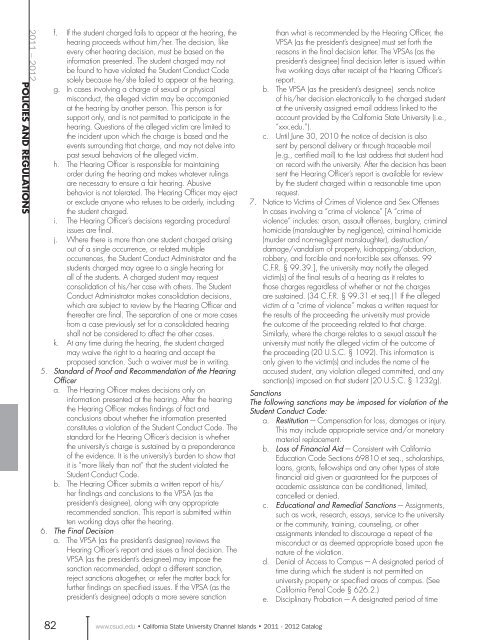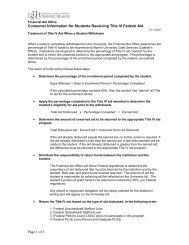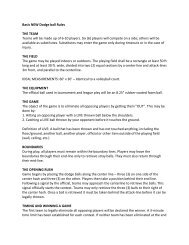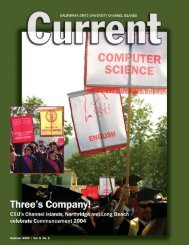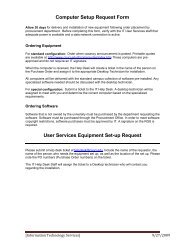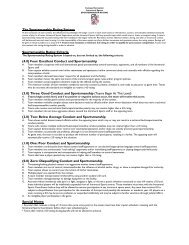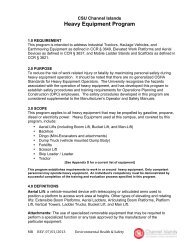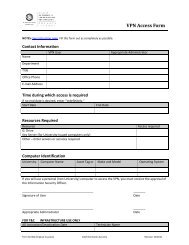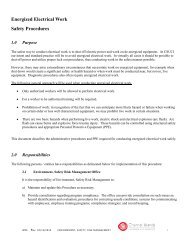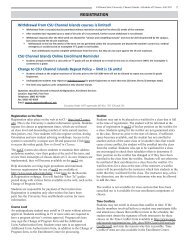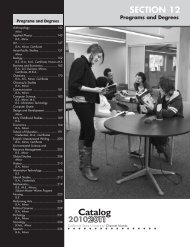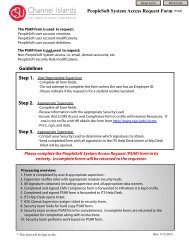Download printable catalog - CSU Channel Islands
Download printable catalog - CSU Channel Islands
Download printable catalog - CSU Channel Islands
You also want an ePaper? Increase the reach of your titles
YUMPU automatically turns print PDFs into web optimized ePapers that Google loves.
2011 – 2012Policies and Regulationsf. If the student charged fails to appear at the hearing, thehearing proceeds without him/her. The decision, likeevery other hearing decision, must be based on theinformation presented. The student charged may notbe found to have violated the Student Conduct Codesolely because he/she failed to appear at the hearing.g. In cases involving a charge of sexual or physicalmisconduct, the alleged victim may be accompaniedat the hearing by another person. This person is forsupport only, and is not permitted to participate in thehearing. Questions of the alleged victim are limited tothe incident upon which the charge is based and theevents surrounding that charge, and may not delve intopast sexual behaviors of the alleged victim.h. The Hearing Officer is responsible for maintainingorder during the hearing and makes whatever rulingsare necessary to ensure a fair hearing. Abusivebehavior is not tolerated. The Hearing Officer may ejector exclude anyone who refuses to be orderly, includingthe student charged.i. The Hearing Officer’s decisions regarding proceduralissues are final.j. Where there is more than one student charged arisingout of a single occurrence, or related multipleoccurrences, the Student Conduct Administrator and thestudents charged may agree to a single hearing forall of the students. A charged student may requestconsolidation of his/her case with others. The StudentConduct Administrator makes consolidation decisions,which are subject to review by the Hearing Officer andthereafter are final. The separation of one or more casesfrom a case previously set for a consolidated hearingshall not be considered to affect the other cases.k. At any time during the hearing, the student chargedmay waive the right to a hearing and accept theproposed sanction. Such a waiver must be in writing.5. Standard of Proof and Recommendation of the HearingOfficera. The Hearing Officer makes decisions only oninformation presented at the hearing. After the hearingthe Hearing Officer makes findings of fact andconclusions about whether the information presentedconstitutes a violation of the Student Conduct Code. Thestandard for the Hearing Officer’s decision is whetherthe university’s charge is sustained by a preponderanceof the evidence. It is the university’s burden to show thatit is “more likely than not” that the student violated theStudent Conduct Code.b. The Hearing Officer submits a written report of his/her findings and conclusions to the VPSA (as thepresident’s designee), along with any appropriaterecommended sanction. This report is submitted withinten working days after the hearing.6. The Final Decisiona. The VPSA (as the president’s designee) reviews theHearing Officer’s report and issues a final decision. TheVPSA (as the president’s designee) may impose thesanction recommended, adopt a different sanction,reject sanctions altogether, or refer the matter back forfurther findings on specified issues. If the VPSA (as thepresident’s designee) adopts a more severe sanctionthan what is recommended by the Hearing Officer, theVPSA (as the president’s designee) must set forth thereasons in the final decision letter. The VPSAs (as thepresident’s designee) final decision letter is issued withinfive working days after receipt of the Hearing Officer’sreport.b. The VPSA (as the president’s designee) sends noticeof his/her decision electronically to the charged studentat the university assigned e-mail address linked to theaccount provided by the California State University (i.e.,“xxx.edu.”).c. Until June 30, 2010 the notice of decision is alsosent by personal delivery or through traceable mail(e.g., certified mail) to the last address that student hadon record with the university. After the decision has beensent the Hearing Officer’s report is available for reviewby the student charged within a reasonable time uponrequest.7. Notice to Victims of Crimes of Violence and Sex OffensesIn cases involving a “crime of violence” [A “crime ofviolence” includes: arson, assault offenses, burglary, criminalhomicide (manslaughter by negligence), criminal homicide(murder and non-negligent manslaughter), destruction/damage/vandalism of property, kidnapping/abduction,robbery, and forcible and non-forcible sex offenses. 99C.F.R. § 99.39.], the university may notify the allegedvictim(s) of the final results of a hearing as it relates tothose charges regardless of whether or not the chargesare sustained. (34 C.F.R. § 99.31 et seq.)1 If the allegedvictim of a “crime of violence” makes a written request forthe results of the proceeding the university must providethe outcome of the proceeding related to that charge.Similarly, where the charge relates to a sexual assault theuniversity must notify the alleged victim of the outcome ofthe proceeding (20 U.S.C. § 1092). This information isonly given to the victim(s) and includes the name of theaccused student, any violation alleged committed, and anysanction(s) imposed on that student (20 U.S.C. § 1232g).SanctionsThe following sanctions may be imposed for violation of theStudent Conduct Code:a. Restitution -– Compensation for loss, damages or injury.This may include appropriate service and/or monetarymaterial replacement.b. Loss of Financial Aid -– Consistent with CaliforniaEducation Code Sections 69810 et seq., scholarships,loans, grants, fellowships and any other types of statefinancial aid given or guaranteed for the purposes ofacademic assistance can be conditioned, limited,cancelled or denied.c. Educational and Remedial Sanctions -– Assignments,such as work, research, essays, service to the universityor the community, training, counseling, or otherassignments intended to discourage a repeat of themisconduct or as deemed appropriate based upon thenature of the violation.d. Denial of Access to Campus -– A designated period oftime during which the student is not permitted onuniversity property or specified areas of campus. (SeeCalifornia Penal Code § 626.2.)e. Disciplinary Probation -– A designated period of time82 www.csuci.edu • California State University <strong>Channel</strong> <strong>Islands</strong> • 2011 - 2012 Catalog


